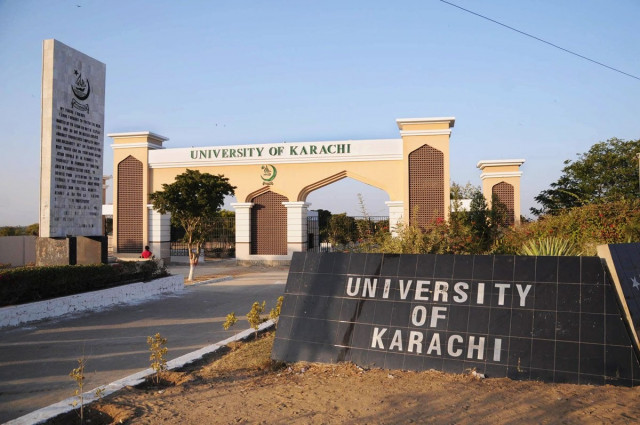KU laboratory work suffers in the wake of power outages
Chemicals, microorganisms at risk of damage due to fluctuations in temperature of freezers

University of Karachi. PHOTO: MOHAMAMD NOMAN/EXPRESS
A cause of concern for Karachi University (KU) is that of its 75 departments, around 20 are science-based and make use of the varsity’s 20 laboratories.
The departments have microorganism chemicals, microscopic unicellular organisms, enzymes, toxic solutions, biological catalysts and chemicals worth millions of rupees stored at their laboratories. Unannounced power suspensions for as long as 16 hours can damage all the chemicals in one go, the former secretary of the Karachi University Teachers Society and member of the varsity’s syndicate, Dr Muhammad Moiz Khan told to The Express Tribune.
Asif apologises for Sindh power breakdown
The main laboratories being affected by the intermittent failures are those of the biotechnology, bio-chemistry, microbiology, pharmacy, chemistry and marine sciences departments. The university has been facing eight to 10 hours of load-shedding a day, while power cuts can stretch to 16 hours when temperatures in the city rise.
“All the chemicals and organisms need to be kept in controlled temperatures so the chemicals don’t change their natural properties,” explained Dr Khan, adding that if the chemicals are affected, the research will be affected too. “Many doctorate level students use a single sample for their research for as long as two years and if the sample is ruined due to temperature changes then who will be responsible for it?” he questioned.
“The chemicals need to be kept at low required to be kept at low temperatures or else they lose their efficacy,” warned Dr Tasneem Azam Ali, dean of sciences and chairperson of the varsity’s department of microbiology.
Power outages during first sehri foretell a difficult Ramazan
Speaking about the temperature at which the enzymes and organisms must be kept, she said some molecular biology specimens are required to be stored in freezers with temperatures ranging from -30° Celsius to -70°C. “If we do not have electricity for hours the enzymes and organisms will change temperature and start multiplying themselves,” she said, adding that preserving them makes them static, because if they increase their growth and start multiplying, then months-worth of doctorate level research goes down the drain.
Few microorganisms can be kept at temperatures between 4°C and 10°C but temperatures as high as 15°C are not acceptable for almost any microorganisms, she said.
“Enzymes for microbiology of between 10 and 25 grammes are worth of thousands of rupees,” she added.
The university gets annual funding for research purposes and to purchase organisms. Dr Khan said, being a public sector university, they do not have enough funds to run a generator to control the temperature at the fridges and freezers where the chemicals are preserved.
Major power breakdown hits Karachi again
“We have a few generators at the varsity but they are for emergency use and can only be used for few hours, definitely not for 16 hours at a stretch,” he said, adding that the generators are not automated and it is difficult to operate them if the power supply is disrupted late at night. Each department has around 50 to 80 refrigerators in their laboratories and faculty rooms where organisms on which research is being conducted are stored.
Dr Khan said that in 2014 they had requested K-Electric to exempt the university from load-shedding. “They exempted us at the time and the university got uninterrupted supply through the internal stations,” he said, adding that after the heatwave of 2015 load-shedding at the varsity resumed and has now gone out of control.
The power suspensions do not only affect the chemicals and organisms, the laboratory equipment is also at risk due to power fluctuation. If damaged, the university’s electronic microscopes cannot be bought again as there is a lack of funds.
However, according to K-Electric’s Director of Communications Sadia Dada, supply to KU is uninterrupted. If there are any complaints, then it must be an internal fault, which is to be dealt with the university itself, she said.



















COMMENTS
Comments are moderated and generally will be posted if they are on-topic and not abusive.
For more information, please see our Comments FAQ